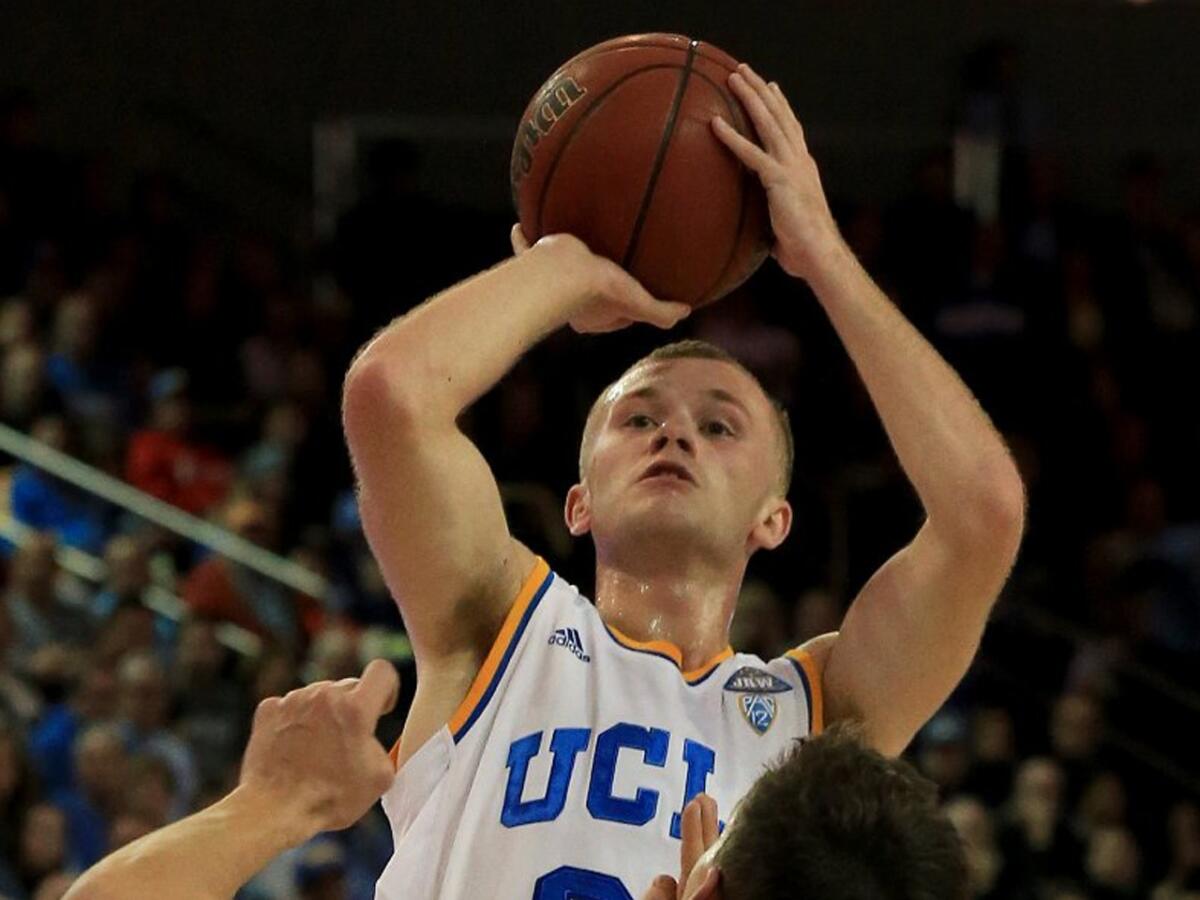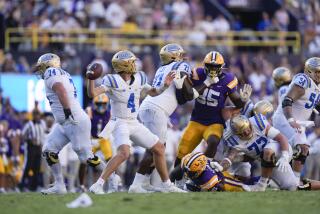UCLA’s Bryce Alford wants to bust slump with more shots

Bryce Alford said he has never experienced anything like it in his life.
Alford’s defining trait is his shot. And right now, he can’t get one to fall. Alford has missed every single one of his last 19 attempts, a streak that spans more than a game.
How does he overcome that? With more shots.
“Being a shooter, you kind of have to have that eraser in your mind of not knowing what happened on the last shot if you missed a shot,” Alford said. “And that’s what the coaches tell me, that’s what my guys tell me, is keep shooting the ball.”
The problem is, Alford is also the point guard, meaning he also needs to get his teammates involved. Alford conceded that his shooting hurt the team in a loss to Colorado on Friday. In that game, Alford shot two for 16 from the field, including missing all nine three-point attempts. He had four assists.
Before a film session Tuesday, Alford described a balance he must try to attain. His instincts are to keep shooting, but that can hurt the team. He said that although he was 0 for 10 against Utah, he helped distribute more and earned five assists.
“There comes a point where you got to understand that if shots aren’t falling for you as the point guard you’ve got to get everybody else involved,” Alford said. “And I think I did a poor job of that in the Colorado game especially. But in the Utah game I felt like I did a lot better job of noticing that my shots didn’t fall and just try to help others as much as I could.”
Alford leads the team in shots, with 12.4 per game. That’s not typical of a point guard.
UCLA Coach Steve Alford explained that, on a team with limited scoring options, Bryce must fill two roles.
“There’s so much pressure on him [because] he’s not just a point guard that has to distribute, he’s a point guard that has to score on this team because we are challenged a little bit offensively,” Steve Alford said. “So I think it’s just getting that balance.”
When Alford is shooting well, he is one of UCLA’s best weapons. He leads the team in points, averaging 15.7 per game.
When his shot is off, there are limited options behind him. Isaac Hamilton has played the shooting guard role and hasn’t yet shown a command of the offense. Noah Allen, a reserve player, is more of a defensive option, Steve Alford said.
So, for now, Bryce Alford’s role remains the same.
“I don’t think you change a whole lot,” Bryce Alford said. “You kind of go and trust what you’ve done your whole life and trust what I’ve done for the first 12 games of the season. I’ve been aggressive and I’ve tried to get my teammates involved and tried to get myself involved when we needed that aspect of my game.”
The Kentucky effect
More than two weeks removed from a humiliating loss to Kentucky, UCLA is still feeling the reverberations.
UCLA lost its next three games, extending its losing streak to five. After the seven-point first half against the Wildcats, the Bruins’ offense has collapsed and the pace has crawled.
“It’s like a boxer that gets knocked out,” Steve Alford said. “OK, I want to get back in the ring, but still a little worried about getting hit. And we see a little of that in our young guys.”
UCLA’s struggles are no mystery. The Bruins never had much depth, and they lost another scholarship player when Wanaah Bail was declared academically ineligible. Finding scorers was a problem in the preseason. And their schedule during the losing streak — three games against top-10 opponents and four true road games — was brutal.
But the disappearance of the offense suggests deeper issues. The Bruins have failed to score 20 first-half points in three of four games and haven’t shot over 32% from the field in four games.
That’s why, when asked whether he has seen progress this season, Alford praised the improvement of the defense. But offensively, there wasn’t much to note. Once quick and lethal, the pace has slowed. The shooting is baffling.
Steve Alford said that comes with a young team still figuring out how to play on the road and react to losses.
“You never know what it does to somebody’s psyche,” Steve Alford said. “When you get smacked like Kentucky smacked us, that wasn’t easy.”
Alford added that the problem isn’t with the effort. Norman Powell agreed, saying the team still has much to play for.
“It’s tough when you get embarrassed like that on TV,” Powell said. “But I feel like we have a group of guys who are still hungry and still motivated. Teams have been blown out in the past, and they’ve gone on to do great things. Teams have lost multiple games in a row and they’ve gone on to make the tournament, make a run in the tournament.”
Looney’s lull
Three weeks ago, Kevon Looney was putting up better numbers than almost any freshman in the nation. He had played himself into NBA draft lottery consideration.
At the time, Looney seemed to be a double-double machine. In his first 11 games, he had eight double-doubles, and he scored in double figures in all 11 games.
But beginning with the Kentucky loss, Looney has hit a wall. In four games, he hasn’t reached double figures in points or rebounds. He is now averaging slightly less than a double-double, with 12 points and 9.9 rebounds.
“I haven’t played the way I wanted to,” Looney said.
Steve Alford said he is not too worried about Looney’s production just yet. He noted that Looney was coming off his first true road games and his first Pac-12 action.
“One thing about Kevon is, he’s tough,” Alford said. “He’s tough, and he really knows how to play.”
Twitter: @zhelfand
More to Read
Go beyond the scoreboard
Get the latest on L.A.'s teams in the daily Sports Report newsletter.
You may occasionally receive promotional content from the Los Angeles Times.







